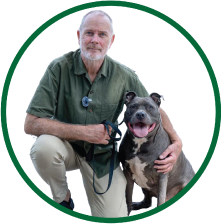Why Too Much Emotion Can Harm Your Puppy’s or Newly Adopted Dog's Development
 One of the most common consultations I attend involves dogs or puppies suffering from psychological instability — a root cause of many behavioural issues. In many of these cases, the problem doesn’t stem from a lack of love, but rather from too much of it — or more specifically, love given without boundaries, structure, or understanding of what the dog actually needs.
One of the most common consultations I attend involves dogs or puppies suffering from psychological instability — a root cause of many behavioural issues. In many of these cases, the problem doesn’t stem from a lack of love, but rather from too much of it — or more specifically, love given without boundaries, structure, or understanding of what the dog actually needs.
Dogs in their natural environment are not overly affectionate animals. Their social systems are based on calm energy, clear communication, space, and mutual respect — not constant cuddles or emotional intensity. A mother dog, for instance, instinctively begins to break her pups’ dependency as they grow, especially during the weaning period. This is a critical developmental phase where the mother teaches her pups to stand on their own, fostering independence and emotional resilience.
In contrast, humans — being emotional creatures — often allow feelings to override instinct and logic. Many new puppy or rescue dog owners shower their dogs with affection from the moment they arrive, with little regard for the psychological consequences. While the intention is loving, the result is often a dog that becomes overly dependent, anxious, demanding, and unstable. These dogs struggle to self-soothe, lack impulse control, and may even develop behavioural problems such as separation anxiety, reactivity, or excessive attention-seeking.
To be clear, I’m not suggesting we shouldn’t give our dogs affection. Of course we should. But when emotional interactions become excessive — when we treat dogs like fragile children or allow our emotions to drive every decision — we unintentionally create confusion and instability. Dogs need calm, confident leadership far more than they need constant affection. Emotional overindulgence can create a dog that is emotionally overwhelmed and unsure of how to cope without human intervention.
Raising a balanced, well-adjusted dog means learning from them — not the other way around. Dogs are experts at reading energy, boundaries, and social cues. When we mirror that and provide guidance, structure, and clear expectations, we help our dogs feel safe, secure, and confident. Affection has its place, but it must be given in the right context and balanced with calm authority and consistent rules.
In the end, never expect more from your dog than you’re willing to put in yourself. If you want a calm, stable, well-mannered dog, you need to lead with calmness, stability, and clarity. Love isn’t just about affection — it’s also about guidance, boundaries, and helping your dog become the best version of themselves.
If you're in Hanoi and struggling with your new puppy or dog, reach out to me. I can help you both get back on track and build a more stable, fulfilling relationship. Please follow the links in the menu to read about my in-home consultations.
